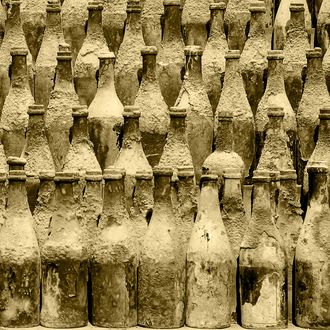
Every New Year, chances are at least one person you know (or maybe it’s you!) assigns him- or herself a Dry January — a month without alcohol, in order to atone for holiday excesses or greet the shiny New Year with a fresh, hangover-free start. For those of us who’ve never attempted a booze-free start to the year, it’s tempting to scoff at the supposed merits of such an abstinence pledge. It’s only a month, after all: What good could that possibly do? It’s like those people who make a lot of noise about quitting Facebook and then quietly come right back. But — I am terribly sorry to share this — we now have ourselves a bit of evidence that, yeah, taking a 31-day break from booze is pretty smart from a health perspective, according to a little experiment conducted by staffers at New Scientist.
On the one hand: duh. But on the other: Despite the popularity of Dry January, there actually isn’t a ton of scientific literature on the effects of briefly abstaining from alcohol. (It’s apparently especially popular in the U.K., where public-health officials have even begun a campaign to urge Brits toward a booze-free month.) And so last year, the editors of New Scientist, seeking medical and scientific information about a month without alcohol and finding none, decided to take matters into their own hands.
Fourteen New Scientist staffers — who, incidentally, all rated their personal drinking habits as normal — agreed to participate in an experiment led by Rajiv Jalan at University College London. In early October of last year, they took a series of surveys and medical tests. Four of them then continued drinking as they usually did, and 10 quit booze until early November, when all 14 repeated the same tests. When Jalan analyzed the results, he found that those who’d kept to their normal drinking habits didn’t show any significant changes in the health markers measured, but he did find consistent changes in the results for the ten who did abstain from alcohol for the month.
From New Scientist:
Liver fat fell on average by 15 per cent, and by almost 20 per cent in some individuals. Jalan says this is highly significant, because fat accumulation on the liver is a known prelude to liver damage. It can cause inflammation, resulting in liver disease. “This transition is the harbinger first for temporary scarring called fibrosis and ultimately a non-reversible type of scarring that destroys liver structure, called cirrhosis,” says Jalan. Although our livers were all judged to be generally healthy, the fat reductions would almost certainly help to retard liver deterioration, he says.
Then came another surprise. The blood glucose levels of the abstainers dropped by 16 per cent on average, from 5.1 to 4.3 millimoles per litre. The normal range for blood glucose is between 3.9 and 5.6 mmol/l. “I was staggered,” says Kevin Moore, consultant in liver health services at UCLMS. “I don’t think anyone has ever observed that before.”
The abstainers also reported that they slept better and were more focused than usual during their month off from booze. Obviously, it’s not clear if these changes will have any long-term impact on the participants’ health, and, anyway, it’s too small of an experiment to make any large assumptions. But it’s at least a little something for Dry January participants to hang on to, and share with their skeptical friends, while they sip their club soda at happy hour.




